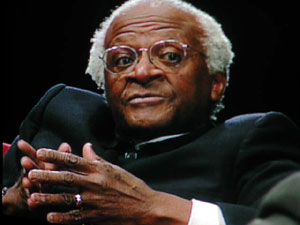|
Photos
Your Voice
|
U.S. civil rights movement fueled anti-apartheid effort, Tutu says
February 26, 2003
 |
| Bishop Tutu was awarded an honorary degree by University of Minnesota. (MPR Photo/Marisa Helms) |
St. Paul, Minn. — The Nobel Peace Prize winner spoke with University Vice President Robert Jones about the past, present and future struggles of South Africa.
Tutu says the system of apartheid that oppressed black South Africans for generations still lives in the shadows as his country strives for education and equality for everyone.
"How do you tell a blind man this is a red rose? How do you tell someone who is deaf, that I'm listening to a Beethoven symphony? How do you tell someone who has never been free what it means now to be free? A great deal of the physical circumstances of our country have not changed," he said.
 | |||
Tutu says too many people are still living in shacks. AIDS and crime driven by high unemployment are great obstacles. He says deprivation of education for blacks was one of apartheid's most insidious effects.
He says the government spent five times the money educating white children than it spent on blacks. "This was education for perpetual serfdom. There were subjects in the history syllabus that you were not supposed to teach blacks because it would put bad ideas into their head. Don't teach them about the French Revolution. Don't teach them about the American war of independence, they might get bad ideas."
Tutu says he and many other South Africans took heart in the struggles and achievements of African Americans.
"When I was in a ghetto township, I picked up a tattered copy of Ebony magazine. I don't know where that came from. But, it was one that was describing Jackie Robinson's breaking into major league baseball. Now, I didn't know baseball from ping pong. But what was important for me was, 'Hey, man! Here is a black man who has overcome all kinds of odds, and made it! I will make it too,'" Tutu said.
Tutu says during the time of black resistance and non-violent protests against apartheid, the country became riddled with suspicion. He and others were constantly tracked by South African Intelligence Agents. Many people were killed or disappeared.
In 1984, Tutu was awarded the Nobel Peace Prize for his non-violent campaign against apartheid in South Africa.
Tutu says the economic sanctions in the mid-1980s also helped to bring down the apartheid regime. He says the South African government realized it didn't have the resources to maintain its power without support from the international community.
|
The voice of the people is not always the voice of God.
- Bishop Tutu |
In 1994, all-race elections were held and Nelson Mandela became the new president of South Africa.
Tutu says the Truth and Reconciliation Commission set up to confront the country's past brought closure for many black South Africans.
Tutu has been outspoken against a possible war with Iraq. He spoke at the recent anti-war demonstration in New York City held in conjunction with demonstrations around the world. He called that day's international rallies an "awesome display of people power."
During a question and answer session with the audience at Northrup Auditorium, Tutu was asked what advice he would give President George W. Bush on how to gracefully back out of a plan to attack Iraq.
"I would say to him, there is a saying in Latin -- vox populi vox dai -- the voice of the people is not always the voice of God. And since he is a man of faith, when God speaks, he should listen,". he said.
Tutu also spoke of a kind of Marshall Plan for South Africa. He says money and support from the international community would help South Africa recover from the devastation of apartheid.
At the end of the evening, Tutu was awarded an honorary degree by University of Minnesota President Robert Bruininks and Maureen Reed, Chair of the Board of Regents.
|
News Headlines
|
Related Subjects
|
